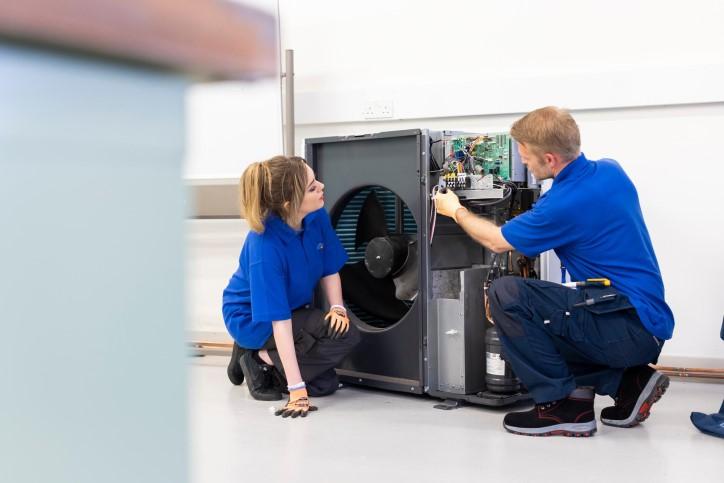CYMRU SPECIAL
ORP Phase 3: Highlighting the Core Objectives and Benchmarks for Success

2023
July



P housingindustryleaders.com S
Air. Our flagship monobloc heat pump.
IDEAL HEAT PUMP PACKAGE
our monobloc heat pump, the pre-plumbed
Air thermostat. AVAILABLE NOW FIND OUT MORE
Logic
THE
Includes
heat pump cylinder and Halo
Contents
P.04
Foreword
P.05
Housing Industry Leaders: Cymru Schedule
P.06
Keynote Speaker: Rt Hon Mark Drakeford MS
P.08
Cymru Speakers: Leading the Industry
P.12
Leading Product and Service: Ideal Heating
P.16
Housing Industry Leaders: Event Overview
P.18
Swansea Embarkson Latest in Portfolio of Decarbonisation Schemes


P.20
Airex smart bricks: Making the Best use of Technology for Resident Needs
P.22
TrustMark: Ensuring Quality Assured Retrofit Across Wales
P.24
ORP Phase 3: Highlighting the Core Objectives and Benchmarks for Success
P.26
A Technology-Agnostic Approach to Heat and Building Policy
P.28
Building Good Quality Housing Stock Across Scotland
Multimedia Editor
Floyd March
Multimedia Journalist
Chelsea Bailey
Multimedia Journalist
Hannah Wintle
Graphic Designer
Edward Boustred
P. 3
FOREWORD
Welcome to the Event Special Magazine
It is with great pleasure that I welcome you to the Housing Industry Leaders Cymru event and the launch of our latest Magazine. We stand at a pivotal moment in the history of the housing industry, where innovation and collaboration are reshaping the way we think about homes and communities.
The challenges facing the housing sector are diverse and complex, ranging from affordability, sustainability and the need for inclusive housing solutions. However, I firmly believe that with challenges come opportunities, and the Housing Industry Leaders Cymru event serves as a platform for us to explore and harness those opportunities.
Over the years, the housing industry in Wales has shown incredible resilience, adaptability, and dedication to meeting the evolving needs of our communities. We must continuously strive for innovation and excellence, as well as foster collaboration among industry leaders, policymakers, and community stakeholders.

This magazine is a testament to the shared commitment of all those involved in the housing sector to make a positive impact on people's lives. It serves as a platform for thought-provoking discussions, best practices sharing, and the exchange of innovative ideas that will shape the future of housing in Wales and beyond. Within these pages, you will find insights from industry experts, case studies of successful projects, and a glimpse into the latest trends and technologies that are transforming the housing landscape.
Moreover, this event and the magazine provide an opportunity for us to address the pressing issues facing the housing industry. From the urgent need for affordable housing and tackling homelessness to creating sustainable, energy-efficient homes, we must come together to find holistic and equitable solutions. The challenges we face are not insurmountable if we unite our efforts and tap into the collective expertise and creativity of our industry leaders.
I invite all participants to engage in the discussions, networking opportunities, and knowledge sharing that this event offers.
I wish you all an inspiring and informative event, and I look forward to the meaningful conversations and outcomes that will undoubtedly arise over the course of the day.
Martin Taylor Director Peloton Events m.taylor@peloton-events.co.uk
Cymru Event Special P. 4
SCHEDULE
SESSION A | Decarbonising the Housing Stock
09.15 - 09.30 Tim German, Government Relations, Energy Systems Catapult
09.30 - 09.45 Phil Mason, Head of Regulatory Engagement, TrustMark
09.45 - 10.00 Carl Raison, Technical Sales Manager, Ideal Heating
10.00 - 10.15 Jackie Leonard, Head of Projects (Wales), CHIC
10.15 - 10.45
Panel Discussion: The Drive to Net Zero and What it Means for Decarbonising the Housing Sector

• Jack Wilkinson-Dix, Policy Manager, Energy Saving Trust
• Lynne Sullivan OBE, Net Zero Performance Hub
• Jackie Leonard, Head of Projects (Wales), CHIC
10.45 - 11.00 Ian Mather, National Business Development Manager, British Gas and Lisa Bunting, Senior Business Development Manager, Hive DSR
11.00 - 11.50
Refreshments and Networking
SESSION B | Funding
11.50 - 12.05 Cenydd Rowlands, Property Director, Development Bank Wales
12.05 - 12.35 Panel Discussion: How do we Finance Good Quality, Low-carbon Homes
• Emma Harvey-Smith, Director, Green Finance Institute
• Chad Griffiths, Senior Portfolio Manager, Principality Building Society
• Cenydd Rowlands, Property Director, Development Bank Wales
12.50 - 13.20
13.25 - 14.25
Technical Seminar: Nexgen Heating and Airex
Lunch and Refreshments
SESSION C | Green Skills and the Housing Sector
14.30 - 15.00
Panel Discussion: Looking to the Future, Embedding New Skills and Taking Advantage of Innovations in Construction Build and Techniques
• Richard Tobutt, Regional Skills Partnership Manager, Cardiff Capital Region
• Gareth Williams, Standards and Qualifications Manager, CITB
• Iain Jordan, Regional Sales Manager, Nuaire Residential
• Jane Lewis, Regional Partnership Manager, South West Wales RSLP
15.00 - 15.20
First Minister Mark Drakeford MS
SESSION D | Low-Carbon Technologies
15.20 - 15.35 Ben Copson, Policy Advisor, Sustainable Energy Association
15.35 - 15.50 Andy Flook, Development Director, Sava
15.55 - 16.30
Panel Discussion: How Technology Will Shape the Future
• Harry Cursham, Managing Director, Vivus Solutions
• Ian Mather, National Renewables Strategic Business Development Manager, PH Jones
• James Hoople, Business Development Manager, Mixergy
16.35 - 17.20 Post Event Drinks Reception
P. 5
KEYNOTE SPEAKER
Leading the Industry
Rt Hon Mark Drakeford MS


First Minister of Wales | Welsh Government
Rt Hon Mark Drakeford MS was born and brought up in West Wales before moving to Cardiff more than 30 years ago. Since then, he has lived in the Pontcanna area of Cardiff. A former probation officer, youth justice worker and Barnardos project leader in Ely and Caerau, he has been a professor of Social Policy and Applied Social Sciences at Cardiff University. Mark has also taught previously at Swansea University. In the 1980s and 1990s, Mark was a Labour Councillor on South Glamorgan County Council, specialising in education issues, including Welsh medium education. Between 2000 and 2010 he worked as the Cabinet’s health and social policy adviser at the Welsh Government and was latterly head of the First Minister’s political office. He has a 40-year knowledge of the Cardiff West constituency. Mark became the Assembly Member for Cardiff West in May 2011. He was Chair of the Assembly’s Health and Social Care Committee from July 2011 – March 2013 and of the All-Wales Programme Monitoring Committee for European funds from July 2011 – March 2013. He was appointed Minister for Health and Social Services in March 2013. He was appointed Cabinet Secretary for Finance and Local Government in May 2016. Mark was appointed Cabinet Secretary for Finance on 3 November 2017. On 12 December 2018, Mark was appointed First Minister of Wales and became a member of the Privy Council on 13 February 2019. Mark was appointed First Minister on 13 May 2021.

Cymru Event Special P. 6
UNBOX OUR EXPERTISE
Don’t think heating. Think sustainable business partner.
Before your next project even begins, The Vaillant Standard has your back. With end-to-end expert support on everything from market-leading sustainability and flexible warranties to full heating system design… once you unbox The Vaillant Standard, you’re ready to take on anything.

Scan to unbox our expertise
SPEAKERS
Leading the Industry
Phil Mason
Head of Regulatory Engagement | TrustMark
Phil focuses on developing and managing relationships with key stakeholders in the areas where TrustMark registration is mandatory. This includes close working with government departments and Ofgem. With over 25 years of experience across the energy, safety, and professional services sectors, Phil brings a wealth of expertise and knowledge to the TrustMark leadership team.


Ben Copson
Policy Advisor | Sustainable Energy Association
Ben supports the team in developing consultation responses, carrying out research and writing policy papers to champion the views of the Sustainable Energy Association.




His additional roles include advising and supporting members, collaborating with policymakers, and advocating for the development of net zero buildings that are fit for the future.
Jack Wilkinson-Dix
Policy Manager | Energy Saving Trust
Jack leads on Welsh policy across all of Energy Saving Trust’s areas of interest, including energy efficiency, housing decarbonisation, renewable power, lowcarbon transport, and community energy.
This work involves shaping Energy Saving Trust’s positions on decarbonisation priorities while engaging with government and third-sector stakeholders to promote action on energy and climate change.

Cymru Event Special P. 8
Ian Mather
National Renewables Strategic BDM | PH Jones

Ian has been with British Gas for 17 years, with his career starting in domestic heating surveying and then moving on to green deal, insulation, and renewables. He uses his knowledge and experience to support clients on their journey to net zero using a commonsense approach supporting no regrets decision making.




Harry Cursham
Managing Director | Vivus Solutions
Harry has spent 37 years devoted to the conservation of historic and important buildings. In his final lecture tour, the late Ian Constantinides, a leading figure in architectural conservation described Harry as a “hero of conservation.” This experience has led to ‘The Vivus Solution’ and the combined use of appropriate materials and techniques to achieve “modern” requirements.
Emma Harvey-Smith Programme Director | Green Finance Institute


An experienced and passionate green finance specialist, Emma leads the Green Finance Institute’s built environment programme.
Since joining the GFI in 2019, Emma has chaired the 400+ member Coalition for the Energy Efficiency of Buildings (CEEB) and now oversees a multi-strand programme that catalyses green home finance markets through place-based partnerships, industry collaborations, and strategy engagement with HM Government.
P. 9
SPEAKERS
Leading the Industry
Lynne Sullivan OBE


Architect | RIBA - LSA Studio
Lynne is an Architect, now a design consultant and Visiting Professor, and is a Design Advisor for RIBA Competitions, the Design Council, and for local and national Design Commissions and Review Panels including Design Commission for Wales.
She has authored and chaired research projects for policy advice on the sustainable built environment: “A Low Carbon Building Standards Strategy for Scotland” and outputs for the Zero Carbon Hub 2009-2015.

Richard Kemp-Harper
Chief Commercial Officer | Airex
Richard is the CCO of Airex - A senior business leader with over 15 years of experience in product and technology strategy development in the energy and transport sectors.


He holds a PhD in Chemistry and Biochemistry and has a background in working with key stakeholders in government, business, and academia. He has a keen appetite for sustainability and helping organisations achieve their net zero goals.
Jane Lewis
Regional Partnerships Manager | RLSP
Jane manages the Skills Partnership as well as the Regional Engagement Team for the Swansea Bay City Region.

Her role involves the facilitation and development of step-change, collaborative working and ultimately improvement for the stakeholders in the region for the benefit of learners and employers. Jane also leads the development and delivery of the Skills and Talent Initiative under the Swansea Bay City Deal.

Cymru Event Special P. 10
Iain Jordan
Regional Sales Manager - RMI | Nuaire
Iain has been with Nuaire since January 2009. He started initially as a sales rep and experienced selling into both the RMI and new build markets. Iain was promoted to a Regional Sales Manager in July 2016 and was responsible for managing the 'Northern' newbuild team. Since March 2023, he has been the Divisional Manager of the RMI team. Prior to joining Nuaire, Iain worked for other manufacturers selling into the construction industry but particularly house builders/developers.

Tim German
Senior Strategic Relationship Manager | Energy Systems Catapult
Tim is responsible for managing ESC’s important relationship with devolved and local governments. He has worked with the team which has created and delivered local area energy planning (LAEP) and the LAEP national guidance documents for LAs and network operators. Tim provides the key link between ESC and the Welsh Government, which is the first in the UK to roll out LAEP to each of its Local Authorities.
Richard Tobutt
Regional Skills Partnership Manager | Cardiff Capital Region – Skills Partnership
He is responsible for the strategic management of the Cardiff Capital Region Skills Partnership (CCRSP) which fulfils the Regional Skills Partnership (RSP) role across South East Wales.




Over the years, he has acquired extensive experience operating within the education, lifelong learning, and skills arena. He has developed effective relationships with the government (and its agencies), stakeholders, employers and providers of education and training.

P. 11
SPEAKERS
Leading the Industry



Chad Griffiths
Senior Portfolio Manager | Principality Building Society








Chad is an experienced banking relationship manager with over a decade’s worth of experience providing debt funding to property developers and investors across England & Wales.


With a keen interest in sustainability, Chad was instrumental in launching Principality’s £20m Green Development Fund in 2021, with the aim of encouraging SME house builders to develop more low-carbon homes.



Jackie Leonard
Head of Projects (Wales) | CHIC













Jackie has worked in the social housing sector for over 25 years in a wide variety of roles and consultancy projects at both strategic and operational levels including asset management, fire safety, and reactive repairs. More recently she has joined CHIC, a procurement consortium that helps deliver procurement solutions for the public sector (predominately housing associations). Her role is to advise and support members in Wales to the correct route to market.


Cymru Event Special P. 12


IT’S A NEW DAWN FOR RETROFIT THE VIVUS SOLUTION - EXTERNAL INSULATING RENDER (EWI) SETS A NEW STANDARD FOR HOMES NET ZERO BEFOR IT GOES ON THE WALL UP TO 85% LESS Co2 THAN OTHER PRE MIX RENDERS PATENTED TECHNOLOGY. NOT FOR PROFIT ENTERPRISE PLANNED FOR ALL SOCIAL HOUSING. Contact: harry@vivus.solutions 07944 378 994 www.vivus.soltions
COMPANIES
Leading Product and Service Providers
Ideal Heating
For over 100 years, we’ve been at the forefront of the UK heating industry. Our high-quality products have kept homes and businesses warm since 1906 and we’ve led the industry in setting new standards and pushing technological boundaries. But at Ideal Heating, we are more than boilers. We are committed to a sustainable future and maintaining our core principles of quality, innovation and value, our products range from 20% hydrogen-ready boilers, heat pumps and Heat Interface Units (HIUs), to smart heating systems and more. Visit the Ideal Heating stand to discover our vast array of products including our brand-new Logic Air monobloc heat pump.




Cymru Event Special Radisson Blu, Glasgow housingindustryleaders.com
Conference
Conference
The Industry Leading Housing
The Industry Leading Housing
Get set. Protect. Relax.
Elevate your ring of security with Ring’s whole home security solutions

Always in the know. Never in the dark.
Add eyes and ears inside or out with outdoor security cameras that simply see more. The Spotlight Cam Plus and Floodlight Cam Pro catch every detail in almost any weather with HD video. Protect more, outdoors.
Small in size. Big on protection.
Add security anywhere—inside or out—with the versatile Stick Up Cam Battery. Its wire-free design means you can put it where you need it and move it when you need to.
All the pieces for a peace of mind.
Your family, pets, and property—we protect it all. Ring Alarm Security System packs the power of whole-home security into an affordable, DIY package.
See, hear and speak to visitors from anywhere.
Whether battery-powered, plug-in, or hardwired, Ring Video Doorbells allow you to see, hear, and speak to visitors from anywhere.
Scan here to learn more

Leading the Way CYMRU
Retrofit and Decarbonise
Wales has been given a unique opportunity to retrofit and decarbonise its housing stock through the ORP. Through the event programme, which is split into four sessions, Housing Industry Leaders will bring the most significant talking points of the ORP to the delegates and speakers.


Session A will focus on decarbonising current and future housing stock with presentations from Energy Systems Catapult, TrustMark, Ideal Heating, and CHIC. Regulation will play an integral role in changing the way we develop new housing and retrofit existing housing stock, and the event speakers will unpick this throughout the day.
Additionally, sharing best practices and lessons learned from previous programs of work and policy decisions will be at the heart of the panel debate where the delegates will explore the drive to net zero and what it means for decarbonising the housing sector.
The panel will consist of speakers from the Net Zero Performance Hub, Energy Saving Trust, and CHIC before more presentations from British Gas, and Hive DSR.
Session B will highlight the changes in the way funding is deployed for the latest phase of the ORP. New plans will see major changes in the way retrofit is financed, and navigating how this will play out the event will hear from Development Bank Wales, Green Finance Institue, and Principality Building Society.
ORP is a whole house approach to decarbonising existing homes. It is far more bespoke than previous schemes and takes into account the fabric homes are made.
Cymru Event Special
P. 16
Session C will explore how we navigate the current skills gap, encourage young people into the sector and retain the current workforce. Unpicking this, Cardiff Capital Region, CITB, Nuaire Residential and South West Wales RSLP will be on the third panel discussion of the day.
Green skills are closely linked to new funding revenues and wider decarbonisation targets.
Following this, First Minister Mark Drakeford MS will address the audience to discuss the details of the ORP and the opportunities this brings to the region. Developing skills, ensuring a commitment to future funding, and highlighting the role the Government plays in decarbonising the housing stock in Wales will all be discussed.
Session D will focus on how low-carbon technologies will help deliver all of the topics discussed above and provide a golden thread of information in Wales. Our audience will hear from the Sustainable Energy Association, Sava, Vivus Solutions, British Gas, and Mixergy. In addition to our event programme, we have our monthly magazine for all of our delegates to enjoy throughout the day. It has been curated alongside industry leaders across the UK to provide public and private sector insights.
This issue includes the need to make the best use of technology for resident needs, how TrustMark ensures quality-assured retrofit, and whether a technology-agnostic approach to heat and building policy can ease some bottlenecks in the sector.


With a specific focus on how the social housing sector can expand its housing stock faster, Housing Industry Leaders dives into the most topical discussions and debates about the future of the housing industry.
housingindustryleaders.com
We must continuously strive for innovation and excellence, as well as foster collaboration among industry leaders, policymakers, and community stakeholders.
Be sure to join Housing Industry Leaders in Scotland for the next industry leading housing conference.
P. 17
Swansea Embarks on Latest in Portfolio of Decarbonisation Schemes
by Hannah Wintle
Swansea Council are fitting PV solar panels to over 1,200 council homes in their most recent effort to achieve carbon neutrality by 2040.
Work on the £26 million project, which is funded through Welsh Government grants and council housing rents, will commence in the summer, and continue over the next four years.
In that time, PV solar panels and batteries will enable 1,245 properties to generate and store electricity for on-demand use by individual residents.
Included within these retrofit measures are more than 30 council homes in rural areas, which are not connected to mains gas infrastructure.
Due to the complexities surrounding their remote locations, these homes are often missed in retrofit programmes. Their disconnect from the grid means rural properties often use oil, coal, or LPG heating installations.
These homes will therefore also benefit from an insulation upgrade and have a heat pump installed as a low-carbon heating alternative.
Councillor Andrea Lewis, Joint Deputy Leader and Cabinet Member for Service Transformation, said: "At a time when budgets are tight, the cost of energy is rising and there's clear demand to tackle climate change, this will help families not only during the cost-of-living crisis but also for years to come.
"By retrofitting existing council houses with energy-saving equipment and improving insulation, we'll be helping families and households reduce energy consumption, modernise our properties and manage their bills.”
The scheme is part of the council’s ongoing mission to insulate homes as part of their annual planned maintenance programmes.
‘Homes as Power Stations’ is already evolving Swansea’s domestic energy consumption


This latest scheme falls in line with the Homes as Power Stations (HAPS) initiative, which Swansea Council had previously pioneered in collaboration with Cardiff University and the Welsh Government. Through the initiative, energy efficiency technologies will be introduced to 10,300 homes enabling them to generate their own electricity. 7,000 of these properties will employ retrofit efforts, and the remaining 3,300 will be new-builds.
After being green lit in 2021, these energyefficient homes were pledged to be delivered over the course of five years.
Following an 18-unit development of Passivhaus homes in Swansea’s pilot scheme, the council developed its own Swansea Standard for new build housing.
P. 18
The Swansea Standard is a Fabric First approach following the key principles of Passivhaus design and by which all new build housing needs to comply, and is combined with renewable technologies in order to deliver homes in line with the HAPS initiative.
Some of the homes to already have been delivered by the initiative benefit from solar roofs, Tesla battery storage, ground source heat pumps, and Mechanical Ventilation Heat Recovery systems.
Since its implementation, all new council housing has been built in line with the initiative, and are designed to generate between 60% and 80% of the total energy consumption of the property.
A number of bungalows in Craig Cefn Parc have also been retrofitted in partnership with Cardiff University’s Welsh School of Architecture, which saw the homes receive measures including external wall insulation, new rendering, and energy-efficient windows and doors, as well as the aforementioned renewable technologies.
The More Homes Strategy is the lowcarbon answer to the housing crisis
In addition to the HAPS initiative, the scheme is also in addition to the council’s More Homes strategy, which was introduced in 2016 and aims to build 1000 new energy-efficient council properties within ten years.
Councillor Lewis described the strategy as: ‘The biggest council housebuilding project for a generation.’
At a time when house prices are soaring and the number of council houses has reduced, the strategy has been developed in response to the demand for affordable housing.
Delivering low-carbon social housing was also a key consideration, as the council were keen to address the fuel poverty by providing more energy-efficient homes.
These homes will therefore also benefit from an insulation upgrade and have a heat pump installed as a low-carbon heating alternative.
The strategy aims to deliver a number of developments over the short and long term, all of which reflected the housing need in its given locality.
With local authorities overseeing their own housing requirements, being best placed to assess community needs themselves rather than relying on central government, Swansea Council are taking the opportunity to ensure their efforts are also sustainable.
1,245 council homes in Swansea are due to have solar power support within four years.
Joint Deputy Leader and Cabinet Member for Service Transformation
Swansea continue to strive for net zero
Participating in these various decarbonisation initiatives is in line with the council’s net zero efforts.
Councillor Lewis said the solar panel scheme: "Means 1,245 council homes in Swansea are due to have solar power support within four years.”
In December 2020, a Charter on Climate Change was approved to demonstrate the council’s commitment to a net zero Swansea.
Ultimately, Swansea Council have declared to bring the public, private, and voluntary sectors together, hoping that working collaboratively will achieve their goal of becoming a net zero council by 2030.
 Councillor Andrea Lewis
Councillor Andrea Lewis
P. 19
Airex smart bricks: Making the Best use of Technology for Resident Needs
Net zero targets require a long-term deep retrofit programme, but the times and costs for this are huge. With tight budgets and shorter-term EPC rating targets, utilising ‘quick win’ products such as Airex products can help meet this challenge.
While new technology is emerging all the time and the industry is becoming more efficient, the associated costs are still high. As budgets are limited, especially in social housing, the number of homes that can be retrofitted to the highest standards is also limited. On the other hand, urgent action is needed to achieve the more widespread goal of getting all rented properties to EPC C by 2028.
Experts such as Fionn Stevenson, Professor of Sustainable Design, have suggested that perfect can be the enemy of the good and that there are short-term and cost-effective approaches that can give nearer-term benefits. With funding recently released from SHDF, many social housing providers are looking for these ‘quick wins’ to help them reach targets before the deep retrofit programmes launch.
Designed to be easily retrofitted into existing buildings, Airex products are an example of this approach. They can be installed at low cost and with minimal disruption to occupants. In a typical three-bedroom house, installation time is just one hour. It’s a simple and effective solution that's available now, and gives around half of the benefits of full underfloor insulation at a fraction of the cost.
Airex saves around £200-300 on the average homes energy bill
Airex was part of a large trial with BRE and Ofgem in 115 homes from Portsmouth to Wakefield. The independent analysis of the 10 million data points showed that Airex reduces whole house heat loss by 12-15% and heat loss from suspended floors by 20-23%.

The demonstration of these benefits enabled Airex to be included in the EPC scheme and is worth 2-4 SAP points in typical properties.
Airex is one of the most cost-effective contributions to achieving the target of EPC C and above that all rented homes will soon have to meet.
To date, Airex has been successfully installed in over 1500 private and social homes across the UK. The simple installation and cost-effective EPC gains mean that this technology is a key part of retrofit programmes under government funding schemes such as SHDF and HUG as well as Ofgem-regulated ECO4 scheme.
Andrew Waggott, Energy Services Team Manager at Portsmouth City Council explained: “Airex proved to be a costeffective solution that can be installed with next to no disruption to residents and we were incredibly pleased about the trial results. We continue to support and encourage the development of innovative technologies to help the uptake of energy efficiency measures within the UK housing sector.”
P. 20
Fabric first approach must consider ventilation
Using the fabric first approach, the first ‘quick wins’ include measures such as installing loft insulation, cavity wall insulation, and insulation for floors and roofs. These help to reduce heat loss from a building by creating a barrier between the indoor and outdoor environments. However, if insulation is installed without proper ventilation, it can lead to excess moisture within the building.
Airex products take action on ventilation as well as providing monitoring

Traditional air bricks are often blocked up by residents to avoid draughts, especially those living in fuel poverty. Passive ventilation systems like trickle vents rely on residents to manually manage airflow and their decisions made for their own comfort and approaches to energy saving can lead to poor air quality, and damp and mould issues.
Airex technology monitors internal and external conditions, but the big difference is that the system will take automatic action based on these readings to balance good ventilation with minimising heat loss and draughts. From a resident’s point of view, this automation means that air quality is improved without them having to do anything or modify their behaviour. For landlords, this approach provides an effective way of reducing the risk of damp and mould in their properties without having to send a maintenance team to inspect or do remedial work.
We have a Victorian house which was very cold due to excessive, always open ventilation. Airex appears to have solved that problem and we noticed the benefits almost immediately. We would have no hesitation recommending this company.
Trudi
Private homeowner in Warwickshire
P. 21
Airex smart air bricks address this by
TrustMark: Ensuring Quality Assured Retrofit Across Wales
by Floyd March
In line with the ORP entering phase three across Wales, TrustMark is dedicated to supporting scheme providers and registered businesses to improve standards across the whole sector.
Operating as a not-for-profit social enterprise, TrustMark continually invests in the government-endorsed scheme, to deliver consumer confidence through its expert network of scheme providers and their registered businesses.
TrustMark Scheme Providers commit to meeting the Framework Operating Requirements and ensuring their registered businesses maintain required standards of technical competence, customer service and trading practices.
Breaking this down further, Phil Mason, Head of Regulatory Engagement explained the government's intention through TrustMark is: “For the public to have the utmost confidence that they can find a registered professional with ease.”
Having developed its relationship with both the government and supply chain since 2005, the Master Licence Agreement is continuously connecting people with safe, secure and trusted sources.
Phil explained that the Master Licence Agreement: “Ensures that competent businesses that have good practices are working in the supply chain and TrustMark matches the government's intention to continue doing this successfully.”
This scheme allows for the correct processes to be followed, and if there are any disputes, customers and tenants have a strong level of protection through Trustmark.
TrustMark Assurance provides RSLs with confidence
The TrustMark Assurance is a rigorous test of the quality of retrofit installations. Customers and tenants are protected through this scheme and TrustMark offers the following:
Validation of energy efficiency home improvements, reducing reputational and reporting risk to lenders
Assurance that energy efficiency improvements funding has been used appropriately and installed in line with quality standards
Insights from TrustMark Data Warehouse to support validation for green securitisation transactions, asset value improvements, and reporting on net zero progress in the loan books
Supporting increased tradespeople capacity and capability to deliver energy efficiency improvements in UK homes
Phil explained that these assurances can ease the growing stresses for HA and LAs across the UK. “TrustMark can become part of their risk mitigation strategy because we are a registration and assurance scheme, that are taking people that are already registered and trusted through our licence scheme.”
Direct audits guarantee quality
With TrustMark also completing a direct audit on the retrofit installations: “We [TrustMark] can figure out what the average quality levels look like and react accordingly with the businesses involved. It takes a lot of the headache away from the LAs, HAs and RSLs.”
Through what effectively acts as a three-tier system, TrustMark is uniquely positioned across the whole value chain in the housing sector from landscapers, all the way through to energy trades and beyond.
P. 22
This helicopter view of the sector is created through the Master Licence Agreement awarded by the government in which TrustMark then licence the relevant scheme providers, who then go on to licence the installers and retrofit coordinators etc.
Operating as the only government-endorsed quality scheme uniquely positions TrustMark to see the successful retrofit programmes that are happening across Wales, while also highlighting the pressure points in the retrofit programme and can offer its expertise on how to ease them.
Supply chain maturity is a temporary but deep-rooted issue
Despite the concerns about supply chain maturity, Phil was optimistic in the sense that alongside TrustMark’s work, the established National Retrofit Hub will help address the complex challenges ahead.
It will do this by engaging with, and bringing together all stakeholders across the UK to support local retrofit delivery and is a nonprofit programme working collaboratively across the retrofit sector.
Housing Industry Leaders heard:
“The National Retrofit Hub will go a long way to solve this bottleneck in the sector. TrustMark is connected to this, which will enable us to unlock some of the challenges in technology and innovation involved in retrofit and how we develop the supply chain more.”
Phil Mason
Head of Regulatory Engagement TrustMark
Touching on these pressure points, Phil explained: “As the ORP expands, the retrofit supply chain needs to develop in Wales. The supply chain is challenged in Wales in the sense that it isn't mature enough to deliver the volume of work that we need to deliver between now and 2050.”
This is a widely accepted point across the sector and TrustMark are at the forefront of seeing exactly what parts of the value chain needs boosting and where the improvements are happening directly through new registrations.
Building a new workforce while training the existing one are some of the biggest issues impacting the delivery of retrofit across the UK and Wales. As more people see the housing and construction sector as a viable long-term career, registrations placed at TrustMark will continue to grow.
What we've really got to do is encourage people into retrofit so they see it as a career pathways.
Phil Mason Head of Regulatory Engagement TrustMark
TrustMark is a broad church in terms of the trades that get registered. We register people from landscapers, and carpet cleaners through to energy trades and energy efficiency trades which are all key for the retrofit and wider net zero objectives.
P. 23
ORP Phase 3: Highlighting the Core Objectives and Benchmarks for Success
by Floyd March
As the Optimised RetroFit Programme (ORP) reaches its third phase, Housing Industry Leaders brings you the latest insight into the latest phase, how it has evolved and how success will be measured.
The ORP is described as: “A whole house, pragmatic approach to decarbonising existing homes. It is far more sophisticated and bespoke than previous schemes. It takes into account the fabric or materials homes are made from and the way we heat and store energy. It also takes into account how energy reaches our homes.”
It is open to Registered Social Landlords (RSLs) and Local Authorities (LAs) to install a variety of home decarbonisation measures in existing social housing stock.
Now in its third phase, ORP 3 is designated for the financial years 2022- 2025 and has the following main themes: Affordable warmth, decarbonisation and understanding the best pathway to better energy efficiency for that home and its residents.
Test-and-learn approach has led to big developments for the third phase
ORP has historically embraced a test-and learn approach to decarbonising homes, adopting a risk appetite which matches the innovative and entrepreneurial activity required to decarbonise effectively and efficiently.
Speaking of the differences between the most recent phase and historic phases, Malcolm Davies, Senior Programme Manager for the Welsh Government explained: “ORP 1, 2.1 and 2.2 were competitive funding rounds engaging 11 of Wales' 22 LAs that still retain social housing as well as a number of RSLs.”
With the philosophy of the ORP fundamentally being test-and-learn: “ORP 3 has moved away from being a competitive exercise to embrace a formula funding approach that offers funding to all LHAs and RSLs to ensure all of the social housing sector can engage with the programme.”
All projects must align with the principles set out by the Welsh Government
The core condition of funding is to ensure that proposed projects align with the principles of the programme and deliver the Welsh Government’s vision for the future of social housing.
It is hoped that this will stimulate growth within the sector and further incentivise both the public and private sectors to retrofit the housing stock in Wales and create blueprints for other parts of the UK to follow.
Malcolm added: “This is a more streamlined process, RSLs and LAs already have their business plans for how they are going to upgrade their housing stock.”
Additionally, Housing Industry Leaders heard: “There is a clear link between the ORP and the new Welsh Housing Quality Standard, (the latest edition is due to be released in the Autumn).”
The principles are still the same, the difference is each RSL has an allocation and knows its funding offer across the programme from 2022 to 2025.
P. 24
Malcolm Davies Welsh Government
New benchmarks for success to be calculated through digital solutions
Naturally, new phases of programmes mean new benchmarks for success. For this phase, the benchmark for success is very much wrapped around technology, seeing the data and monitoring how the homes are performing. The data from the homes will be captured through environmental sensors which will be accessible to the residents so they can see what is happening in their home and see the improvements first-hand.
“Welsh Government, working with social landlords and our strategic partner TrustMark will use the valuable data secured through the ORP to learn as much as possible to inform future support for residential decarbonisation”, Malcolm added.


Success will also be measured as the supply chain and workforce grows during this phase. Programmes such as this can often help the wider green economy as the sector procures different types of retrofit solutions through the whole-house approach.
Rounding up, Housing Industry Leaders heard: “It is an exciting and challenging arena to be in, especially during this phase. It is a very expansive arena of design, manufacturing, installing, maintaining, digitalisation and circular economy. The Welsh Government is excited to see how the rollout of this phase goes in line with the Welsh Housing Quality Standards.”
This will help us to understand how to go forward not only with 230000 social homes but all 1.4 million homes across Wales.
Malcolm Davies Welsh Government
P. 25
A TechnologyAgnostic Approach to Heat and Building Policy
by Chelsea Bailey
The UK’s journey to net zero is faced with the massive challenge of decarbonising buildings and the way that they are heated. The UK’s building stock is antiquated, tailored to serve a population from a time when more inefficient means of heating were common.
Consequently, these buildings are thermally inefficient, with those living and working within them facing major health and safety issues.
Sustainable Energy Association (SEA) works to align the interests of businesses, consumers, politicians and the UK Government to help create living and working spaces fit for future generations. It supports the wider improvements to public health and the increase of national employment and economic growth.
Low-carbon technologies are key to making buildings more energy-efficient
Housing Industry Leaders spoke to Ben Copson, Policy Advisor at SEA about the company: “We recognise that there is no single solution to the decarbonisation of energy in buildings. We have a diverse membership that shows the range of technology solutions, financing models, and delivery methods that are required to deliver net zero.”
Ben explained that decarbonising the heat in buildings can’t be easily achieved: “We have a more holistic approach to decarbonising heat and how we support delivering net zero. To get to net zero as quickly as possible, we must make sure that it is a fair transition and that it creates the best outcomes for the building for the consumer, for the grid, for energy security, and for wider society.”
Energy Association
Ben highlighted that technology will be key to achieving this: “We need to stop draughts in buildings as much as we can. We need to ventilate appropriately, and we need to use low-carbon technologies to do this.”
The government must move away from a boom-and-bust approach
The route to net zero will require a diverse array of policies, and regulatory and legislative action within the heat and buildings space to drive widespread uptake of the varied forms of lowcarbon heating technologies for decarbonising UK buildings.
SEA’s ‘A Technology-Agnostic Approach to Heat and Buildings Policy’ report makes recommendations to the UK Government on how it can achieve better outcomes for buildings and calls for changes to national policy development on decarbonising the built environment.
Discussing the report, Ben explained that it looks in detail at how the government is currently supporting decarbonising buildings: “The government has been focusing on one certain technology or housing sector priority at one given time.”
Therefore, the report argues that many different technologies are needed when targeting the best outcomes for the UK’s transition to net zero.
Ben revealed a focus on multiple technologies is needed: “Not having a diverse approach means we could regress and potentially damage valuable technology, like heat pumps.”
W e must create buildings fit for the future to get to net zero in the most prosperous way
Ben Copson
Policy Advisor
Sustainable
P. 26
A technology-agnostic policy approach prioritises the desired outcomes for buildings. These outcomes have become more important due to the current crises that the country faces. A more appropriate application of low-carbon technologies in buildings will play an important role in giving consumers and businesses ownership of their energy and offering the best value, lowest carbon energy.
It is essential to drive quality into the sector, plus in-use performance and real-world measurements to ensure that the technologies deliver the outcomes.
Ben explained that using innovation will benefit the sector: “Using MMC and building passports, for example, will help the sector move towards improved and better ways of delivering net zero.”
On SEA’s holistic delivery of net zero, Ben explained that it is all about low-carbon heating systems: “To move to low-carbon heating, it has to be technology-agnostic. It shouldn’t be channelled into one magic bullet that doesn’t exist. It needs to be the most appropriate technology for that building and for the occupant that delivers the best outcomes.”
He said that it is essential that the government must implement a strategy: “The government needs to assess all these disparate policies from all the different niches across the built environment and draw them together. This will help drive forward a long-term framework for retrofitting and decarbonising buildings.”
Delivering better and healthier buildings for the future, providing the best value for consumers and businesses, and decarbonising the UK’s building stock, are primary drivers for delivering a technology-agonistic approach.

Different aspects of the building sector need to be brought under one policy
Accelerated Route to Net Zero Buildings
Flexible and Smart Building Energy Systems
Effective Consumer Education and Engagement
High Quality Skills and Clear Local and National Planning
Stimulating Manufacturing, Supply Chains and Innovation
P. 27
The benefits of a more agonistic approach:
Building Good Quality Housing Stock Across Scotland
by Floyd March
Scotland have recently launched their Affordable Housing Supply Programme (AHSP) in September 2022.
This programme comprises a range of funding mechanisms for housing providers to deliver homes for social rent, mid-market rent and low-cost home ownership.
With a commitment to delivering 110,000 affordable homes by 2032, the Scottish Government has allocated £752m for 2023-2024 to help support their plans. This comprises of a total capital grant of £581m and financial transactions up totalling £171m.
Scottish Government have also allocated £3.2bn to the country’s local authorities, through Resource Planning Assumptions (RPA) for five years (up to 2026), which assists each council to plan their housing supply.
This includes:
• Glasgow £537m
• Highland £240m
• Edinburgh £233m
• Dumfries & Galloway £106m
• Dundee £89m
• Perth & Kinross £86m
Retrofitting for net zero
Scotland is now mandated to produce energy efficiency and heat decarbonisation through the Local Heat and Energy Efficiency Strategies (LHEES).
Accompanying the Strategies will be LHEES Delivery Plans, which will be developed in partnership with key stakeholders, and provide a strong basis for action for local communities, government, investors, developers and wider stakeholders, pinpointing areas for targeted intervention and early, low-regret measures.
This has led Scotland’s leading authorities to launch their Housing Strategies.
Glasgow Council have launched their draft Housing Strategy 2023 – 2028 focusing on reducing carbon emissions and increasing the carbon efficiency of existing homes, reducing fuel poverty and exploring the potential for heat networks.
Edinburgh Council have launched ‘City Plan 2030’
To tackle the rising population in the city, and with evidence of people’s changing habits due to climate change, their proposed plans include maximising the use of brownfield sites. Their plan includes building 37,000 new homes up to 2032.
Fife Council have confirmed plans to build 1250 homes over the next five years. The programme moves into its fourth phase with £151m to be invested to support the programme and provide new homes.
All this and more will be discussed at our Housing Industry Leaders Scotland conference. For more information as to how you can get involved email enquiry@peloton-events.co.uk, or phone 0161 519 8950
P. 28










Scotland housingindustryleaders.com Radisson Blu, Glasgow 29 November 2023 #HousingLeaders #HousingScotland P. 29
Our Ser vices
We cover the full installation of measures including specification, procurement, servicing and repair, all to help maximise the effective lifespan of your investment, also ensuring your residents have the best possible end user experience.

Heat Pumps

We install both air source and ground source heat pumps, offering greener and cleaner heat to homes.


Battery Mixergy Water Tank

The Mixergy smart hot water tank heats water 5 times faster using a lot less energy.
Smart Electric Storage Heater
Integration with DSR allows these to charge during cheaper periods and then release heat in a controlled way.
To find out more about how we could help you please visit our website www.phjones.co.uk Or scan the code


We install all types of Solar PV as well as support on different inverter technology. Home batteries maximise the potential from Solar PV.

At PH Jones we are committed to supporting our clients on their journey to Net Zero and creating a more sustainable future for residents.
Solar




Continue reading on housingindustryleaders.com Previous Issues eMagazine Jan 2023 Housing Delivery What’s in the Pipeline for Social Housing in 2023? Also In This Issue The Optimised RetroFit Programme: What to Expect in Wales Housing Innovation Vivus Solutions: Putting Fabric First Back in The Spotlight Also In This Issue A New Dawn For Scotland: The State of Housing Post-Sturgeon eMagazine Feb 2023 Cladding Contract The Clock is Ticking: Fix Fire Safety Defects or Face Ban Also In This Issue Phosphate Pollution: Welsh Housing Sites at a Standstill Enhance your knowledge in key technical areas surrounding the housing sector in the UK. eMagazine
Peloton Events UK Ltd

Riverside Building, New Bailey Street, Manchester, M3 5FS
t 0161 519 8950
e enquiry@peloton-events.co.uk
w peloton-events.co.uk











































































 Councillor Andrea Lewis
Councillor Andrea Lewis



























